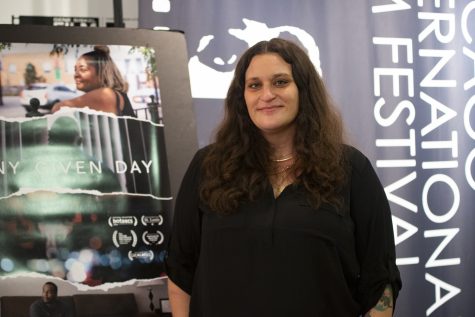Columbia adjunct’s portrait of life with mental illness wins Chicago International Film Festival award
November 9, 2021

Produced and directed by Margaret Byrne, an adjunct faculty member in the Cinema and Television Arts Department, “Any Given Day” won the Chicago International Film Festival’s Chicago Award in the festival’s City and State program.
“Any Given Day” follows the lives of three subjects Byrne meets in a Cook County Mental Health Court probation program, shedding light on how the system treats them and also offering a glimpse into Byrne’s own personal mental health journey.
As part of the 57th Chicago International Film Festival, “Any Given Day” had its U.S. in-person premiere on Oct. 20 at the Gene Siskel Film Center, 164 N. State St.
According to Keeping it Reel, as the winner of the Chicago Award, Byrne will receive in-kind grants from Panavision and Light Iron for a camera rental package and post-production services valued at $45,000.
Byrne started working on the film in 2015 when the Cook County Jail was the largest mental health care provider in the country, before it was surpassed by the Los Angeles County Jail.
“[The jail] led me to really want to look at what happens when we incarcerate people that are in a mental health crisis,” Byrne said.
Byrne and four of the film’s subjects attended the premiere and participated in a panel discussion moderated by Candace Coleman, racial justice organizer for Access Living, after a screening that led to many tears being shed by the audience.

During the panel discussion, Byrne and the film’s subjects talked about their experience making this film over the span of five years.
“Working with Margaret and her opening up about her own issues made me feel a little bit more confident to be able to do this project with her,” said Angela Roche-Peña, one of the film’s main subjects and a Mental Health Court graduate, during the panel discussion.
Byrne said she didn’t know she was going to put her own story in the film until the post-production editing process.
“At a certain point, I knew I had to include my story,” Byrne said. “Otherwise, it wouldn’t be an honest film, because so much of why I made it, why I related to [the subjects], the conversations we were having, were because I had some similar lived experiences.”
Lauren Edidin, the judge overseeing the Cook County Mental Health Court in Skokie that the film’s protagonists participated in and graduated from, said she’s thrilled that viewers will get an opportunity to see and better understand the struggles people with mental illness go through, along with the programs and treatments that help them stabilize.
Byrne said her goal with the film was to have people understand the long-term effects of incarceration on people who are in a mental health crisis.
Over the next two years, the film will be screened for the Cook County Board of Commissioners, as well as at other film festivals. It will also be used by Access Living to raise awareness of the recently-passed Community Emergency Services and Supports Act in Illinois, or CESSA, which will allow mental health crisis 911 calls to be redirected to a mental health crisis team rather than law enforcement.
“We’re really trying to use the film to help educate people about that law, as well as help get support behind it,” Byrne said.







